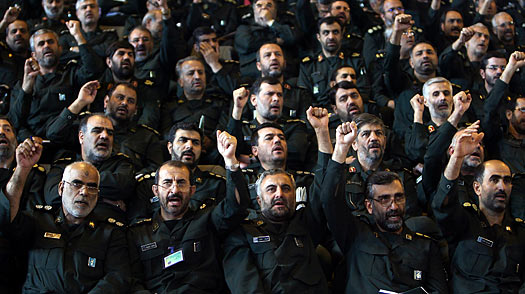Australia/Israel Review
Sanctioning Iran’s Revolutionary Guard
Nov 9, 2017 | Annie Fixler

Annie Fixler
The US Treasury designated Iran’s Islamic Revolutionary Guard Corps (IRGC) under Executive Order (EO) 13224 for its support for terrorism on Oct. 13, pursuant to Congressional legislation. While the immediate legal implications are limited, the designation of the IRGC in its entirety sends a chilling message to companies doing business in Iran.
Since 2007, the IRGC has been under significant US sanctions for its leading role in Iran’s nuclear and ballistic missile programs, yet only one component of the IRGC, the external operations branch known as the Quds Force, had been sanctioned for terrorism. In the intervening years, Treasury also sanctioned the IRGC for systemic human rights abuses in 2011 and 2012. Treasury also sanctioned the Quds Force in 2011 for supporting the Assad regime’s brutality in Syria.
It has been illegal for US persons to transact with the IRGC since 2007, and any IRGC property that comes under the jurisdiction of the United States must be frozen. Additionally, foreign persons providing financial, technical, material or other support to the IRGC could themselves be sanctioned and banned from doing business in the United States. Even as Washington lifted and suspended significant sanctions pursuant to the 2015 nuclear deal, US sanctions on the IRGC remained intact.
The new designation under EO 13224 does not impose additional legal restrictions but communicates the US assessment that the IRGC is a funder of global terrorism. As Treasury noted in its press release, “The IRGC has played a central role in Iran becoming the world’s foremost state sponsor of terror. Iran’s pursuit of power comes at the cost of regional stability.”
Given the Revolutionary Guard’s pervasive role in the Iranian economy, any company doing business with Iran runs the risk of violating this new designation. There are thousands of IRGC subsidiaries and affiliates in Iran, many majority-owned by the IRGC and thus off-limits even if not explicitly named on Treasury’s sanctions lists, and many more controlled by the Guard through minority ownership and seats on boards of directors. Working with any one of them would make foreign companies a partner to a terrorist group and thus expose them to legal risk.
The EO did not add the IRGC to the State Department’s Foreign Terrorist Organisation list. That label carries similar penalties to Treasury sanctions and includes criminal liability for providing material support to a designated organisation. However, unlike the FTO designation, Executive Order 13224 enables Treasury to sanction individuals, companies, and financial institutions that support the IRGC, not just the organisation itself.
Looking ahead, designating the IRGC as a Foreign Terrorist Organisation is a step the Administration might consider if Iran’s aggression continues to escalate. The Revolutionary Guard certainly meets the legal definition for designation. After all, it is a foreign organisation that engages in terrorism which threatens US nationals and US national security. In the past, the State Department has only designated non-governmental groups, not state or para-state organs. But if any organisation merits an exception to this rule, it is the one at the forefront of the malign activities that earn Iran the status of the world’s leading state sponsor of terrorism.
Annie Fixler is a policy analyst at the Foundation for Defence of Democracies’ Centre on Sanctions and Illicit Finance. © Foundation for Defence of Democracies, reprinted by permission, all rights reserved.
Tags: Iran






